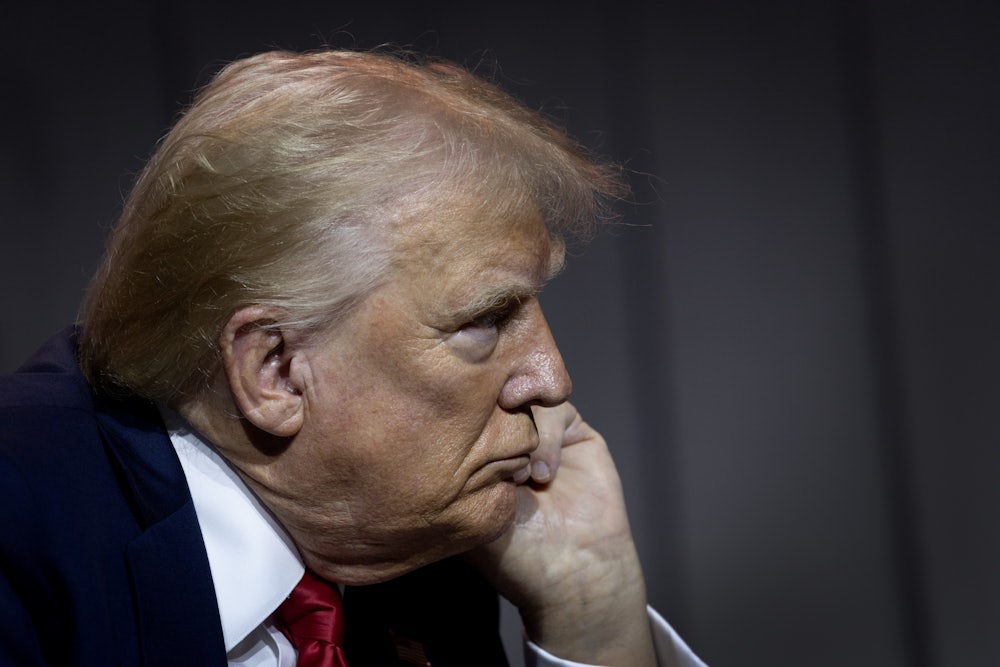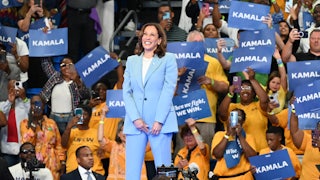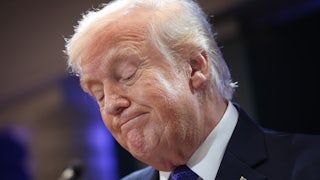There was One (very) Angry Man at the Georgia State University Convocation Center last Saturday. Donald Trump had harsh words for everyone. He insulted his general election opponent, “Crazy Kamala” Harris, for her “low IQ,” and jeered at President Joe Biden for “choking like a dog” during the debate that started the campaign to convince him to step aside for Harris. Trump slammed several Georgia Republicans, including “disloyal” Governor Brian Kemp, who Trump said should “get off his ass” and do something about Atlanta murders. The GOP nominee even went after the host university itself for not letting more people into the at-capacity stadium to see Trump.
That’s a lot of grievances to air at an event meant to rally supporters of the former president as he seeks another term in office. And it’s understandable why Trump—who has appeared flummoxed at times over how to handle a head-to-head campaign against Harris—would go back to his old, winning 2016 playbook: Insult people and groups of people. Blame immigrants, city-dwellers, Democrats, and insufficiently loyal Republicans for the ills of the country and the world.
But anger, a driving force in 2016, is a weakening tactic, eight years after Trump shocked the world by defeating Hillary Clinton. Enough voters were tired of politics as usual that election that they were willing to see if a blunt talker could be better. Biden prevailed in 2020 because voters wanted to turn on the TV and be bored by the president.
Anger is still a powerful motivator for Trump’s base, but he’ll likely need to peel off more voters to score another victory. And he may just have exhausted the mental, physical, and emotional energy of swing voters who are simply tired of his antics and his rage.
“I think Trump is very much playing to his base right now,” but “he might not be winning over some of the folks he really needs,” such as female and suburban voters, Indiana University associate professor Steven Webster, author of the book American Rage: How Anger Shapes Our Politics, told me. “There may be voters in this country who are sick of his anger at the deep state or him, now, going into the 2024 election.” And on top of that, there’s a “newfound enthusiasm” on the side of the Democrats, who are newly hopeful that replacing Biden with Harris could keep the White House in Democratic hands next year, he added.
The hope follows a stunning (and historically un-Democratic) unity in the party, whose leaders and rank-and-file quickly coalesced around Harris as the nominee. I myself incorrectly predicted that pushing Biden out of the way would bring more problems than it solved, leading to a bloody and bitter convention floor fight, with Democratic factions bickering about Gaza, race, gender, and what kind of candidate could mobilize progressives without alienating suburban swing voters. I expected the Democrats to be burdened with having to build an entirely new campaign team and raise money for an entirely new campaign message.
Instead, Democrats had about as smooth a switchover as they could have dreamed they could get. Biden—despite how shabbily fellow Democrats treated him—stepped aside without public complaint, and cleverly did so on the Sunday after the Republican National Convention, stealing Trump’s buzz and turning the spotlight immediately to Harris. With the exception of a comically insignificant interest in the nomination by self-help guru Marianne Williamson, the deal was done. Harris raised a stunning $310 million in July—the vast majority from first-time donors—while Trump and his joint fundraising committees, in the month of the RNC convention, pulled in just $139 million.
Harris’s Georgia rally, held four days before Trump’s, was a polar opposite in tone. Reinforcing her popularity with young people (who were disaffected with Biden), she had rappers Quavo and Megan Thee Stallion perform to a joyous—and newly hopeful—packed stadium. She criticized Trump, for sure, but with none of the barbs and personal insults that poured out of the former president’s mouth. “The path to the White House runs right through this state, and you all helped us win in 2020, and we’re going to do it again in 2024. Yes, we will,” Harris said in a not-so-subtle callback to Barack Obama’s “Yes, we can” message.
Trump knows how to play to an audience, but the audience for his vitriol is limited to those who are already with him, Michael J. Hamner, director of the University of Maryland’s Center for Democracy and Civic Engagement, told me.
“The effectiveness of that [anger] strategy has peaked and sort of plateaued,” Hamner said. “I think it’s really curious when he doubles down on January 6 and on things that are just highly unlikely to resonate with people who are on the fence, people who aren’t just in his camp no matter what.”
In political terms, it’s still a ways to Election Day; unhappy veterans of Clinton’s campaign recall how she went from leading Trump by double digits in a late-October 2016 CNN poll to narrowly losing the election (while winning the popular vote) a couple of weeks later. And former Obama strategist David Axelrod has become the Harris campaign’s official warner (or wet blanket), urging Democrats not to feel “irrational exuberance” over early polls taken while Harris is still in a honeymoon period.
But Trump needs a new campaign message—and a new attitude—if he wants to defeat his new opponent.








